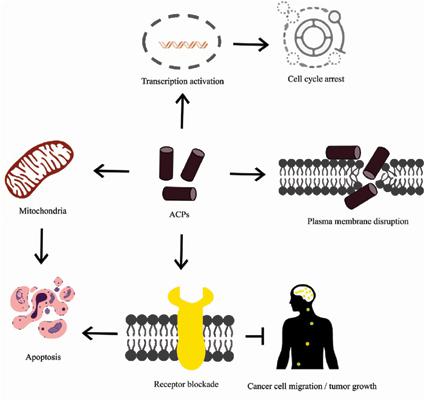Protein & Peptide Letters ( IF 1.0 ) Pub Date : 2020-08-31 , DOI: 10.2174/0929866527666200409102747 Tsuey Ning Soon 1 , Adeline Yoke Yin Chia 1 , Wei Hsum Yap 1 , Yin-Quan Tang 1

|
Despite technological advancement, there is no 100% effective treatment against metastatic cancer. Increasing resistance of cancer cells towards chemotherapeutic drugs along with detrimental side effects remained a concern. Thus, the urgency in developing new anticancer agents has been raised. Anticancer peptides have been proven to display potent activity against a wide variety of cancer cells. Several mode of actions describing their cytostatic and cytotoxic effect on cancer cells have been proposed which involves cell surface binding leading to membranolysis or internalization to reach their intracellular target. Understanding the mechanism of action of these anticancer peptides is important in achieving full therapeutic success. In the present article, we discuss the anticancer action of peptides accompanied by the mechanisms underpinning their toxicity to cancer cells.
中文翻译:

生物活性肽的抗癌机制
尽管技术进步,但尚无100%有效治疗转移癌的方法。癌细胞对化学治疗药物的抗性增加以及有害的副作用仍然是人们关注的问题。因此,提高了开发新的抗癌剂的紧迫性。已经证明抗癌肽对多种癌细胞显示出有效的活性。已经提出了几种描述其对癌细胞的细胞生长抑制作用和细胞毒性作用的作用方式,其涉及细胞表面结合,从而导致膜溶解或内在化,从而达到其细胞内靶标。了解这些抗癌肽的作用机理对于获得完整的治疗成功很重要。在本文中,











































 京公网安备 11010802027423号
京公网安备 11010802027423号